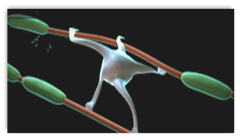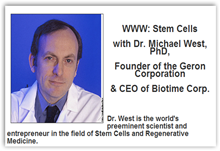We now have 2 more lines of human embryonic stem cells added to the Registry and this is a total now of 93 approved that qualify for federal funding. ESI-014 and  ESI-017 are the two new designations. They are in compliance with the Good Tissue Practices, aka cGTP and will help research in the search for cures. One such stem cell program that has been in the news of late is the clinical trials for spinal cord damage.
ESI-017 are the two new designations. They are in compliance with the Good Tissue Practices, aka cGTP and will help research in the search for cures. One such stem cell program that has been in the news of late is the clinical trials for spinal cord damage.
Stanford Joins Geron Spinal Cord Clinical Trials Program as the 3rd Location in the US
When you are able to see dramatic results with people being able to walk again, this is big and can’t be ignored by all means. One patient in Atlanta with the Geron clinical trial was in the news of late talking about beginning to have “feeling” in areas of his legs and his lap that has been gone for a long time. He has undergone 6 months of therapy so far with small injections of stem cells that they hope will grow new cells. We may also look someday to have joint replacement regenerate with stem cells too and there’s already some research and treatment in this area with knees.
Spinal Cord Injury Patient Treated With Non-Matched Donor Adult Stem Cells Is Walking Again
About BioTime from the Website:
“Regenerative medicine refers to therapies based on human embryonic stem (“hES”) cell technology that are designed to rebuild cell and tissue function lost due to degenerative disease or injury. The great scientific and public interest in regenerative medicine lies in the potential of hES cells to transform into any cell type of the human body. hES cells therefore show considerable potential as a source of new therapies for a host of currently-incurable diseases such as:  diabetes, stroke, Alzheimer’s and Parkinson’s disease, heart failure, arthritis, muscular dystrophy, spinal cord injury, macular degeneration, hearing loss, kidney and liver failure, as well as many other disorders that may be treated by replacing diseased or damaged organ tissues. In response to the unusual potential of the field, the State of California has allocated $3 billion over the next 10 years to fund basic research, and President Obama has lifted previous restrictions for federal funding of stem cell research.
diabetes, stroke, Alzheimer’s and Parkinson’s disease, heart failure, arthritis, muscular dystrophy, spinal cord injury, macular degeneration, hearing loss, kidney and liver failure, as well as many other disorders that may be treated by replacing diseased or damaged organ tissues. In response to the unusual potential of the field, the State of California has allocated $3 billion over the next 10 years to fund basic research, and President Obama has lifted previous restrictions for federal funding of stem cell research.
Led by Dr. Michael West, considered by many to be a founding father of the stem cell industry, BioTime has assembled an array of products and associated intellectual property that give it the potential to be a leader in this exciting new field of medicine.
We are implementing a near-term revenues strategy in the regenerative medicine field by seeking to develop and market advanced hES products and technology that can be used by researchers at universities and biopharmaceutical companies. These research-only products generally can be marketed without regulatory (FDA) approval, and are therefore relatively near-term business opportunities when compared to human therapeutic products. We may also initiate development programs for human therapeutic applications if sufficient capital becomes available to us or through joint efforts with industry partners.”
This is fascinating and fast growing technology and a couple months back I sat in on a web cast to listen to what the founder, Dr. West had to say as well, very educational and informative. There’s quite a bit of information about regenerative medicine at the link including the TED video to where a small liver was “printed”.
Stem Cells Explained-Dr. Michael West Founder of Geron Corporation Stresses The Need For Continued and Accelerated Funding
With the 2 new approvals the doors are open for potential  federal funding for more research and development. If you want to read about more success stories with stem cell treatment, check out Stem Cell Research Facts and there’s a ton of information available at the website. BD
federal funding for more research and development. If you want to read about more success stories with stem cell treatment, check out Stem Cell Research Facts and there’s a ton of information available at the website. BD
ALAMEDA, Calif.--(BUSINESS WIRE)-- BioTime, Inc. (NYSE Amex:BTX), a biotechnology company that develops and markets products in the field of regenerative medicine, today announced that two human embryonic stem (hES) cell lines, ESI-014 and ESI-017, developed by a BioTime subsidiary have been approved by the National Institutes of Health (NIH) for inclusion in the NIH Human Embryonic Stem Cell Registry. This approval opens the door to the use of these cell lines in Federally funded research. To BioTime’s knowledge, these are the first such cell lines approved for Federal funding that were derived under conditions designed to be compliant with current Good Manufacturing Practices (cGMP) for human clinical use.
“This approval is key to our strategy of making our bank of GMP-compliant hES cell lines the industry standard for the development of a wide array of new human therapeutic products,” said Michael D. West, Ph.D., President and CEO of BioTime. “We believe our ESI hES cell lines are the best characterized and documented lines available today. Our clinical grade hES cell lines were derived using procedures and documentation that are in compliance with current Good Tissue Practices (cGTP) and cGMP, which we believe will facilitate the transition of therapeutic products derived by researchers from these cell lines from laboratory to clinical use. We’re grateful the NIH has approved the use of ESI-014 and ESI-017 and we look forward to working with researchers to translate the science into commercially successful therapeutic products.”
The NIH created the Human Embryonic Stem Cell Registry in 2001 in order to facilitate research using human embryonic stem cells. The registry now includes hES cell lines that meet certain eligibility criteria including ethical derivation and informed consent. Only research projects using hES cell lines listed in the Registry are eligible for Federal funding.
BioTime Receives NIH Approval for Two GMP Human Embryonic Stem Cell Lines - Yahoo! Finance



0 comments :
Post a Comment